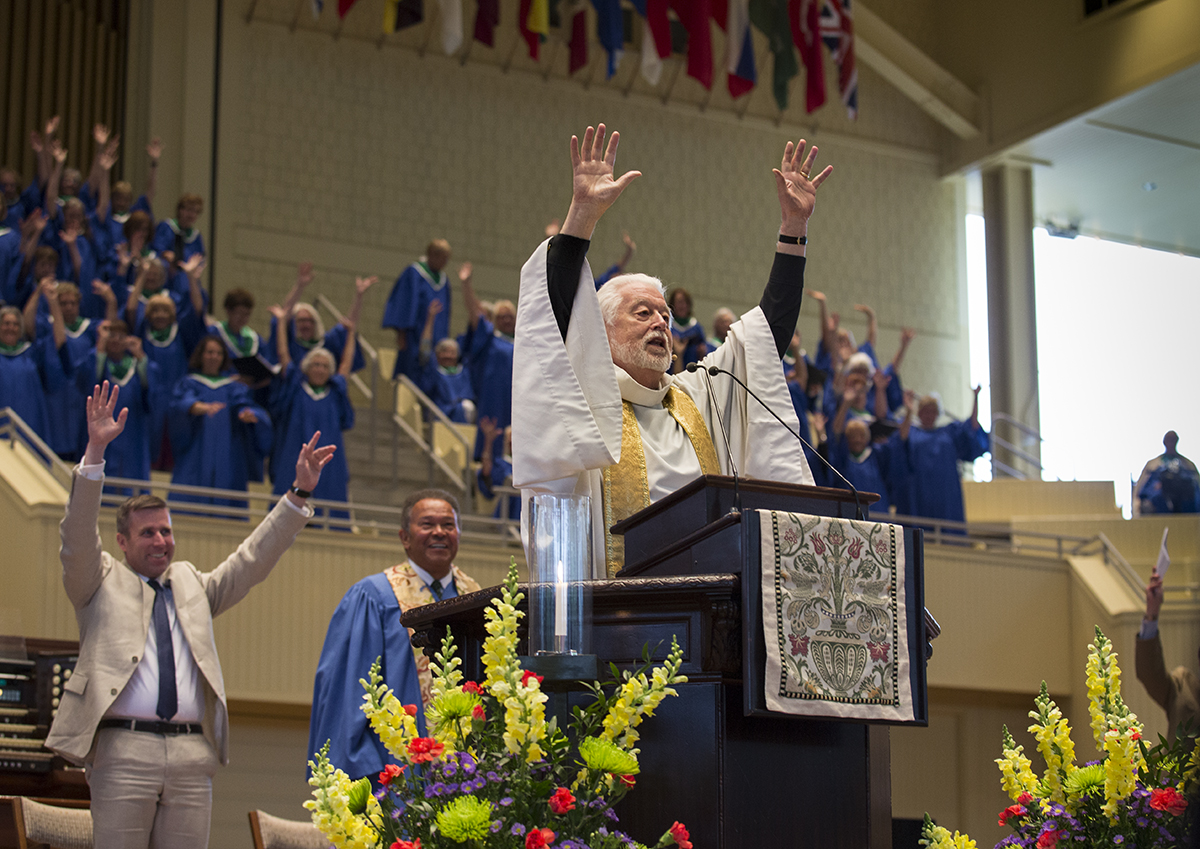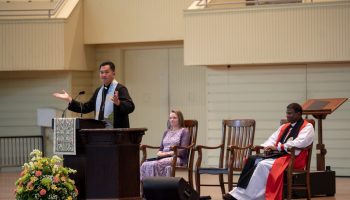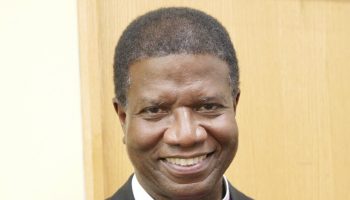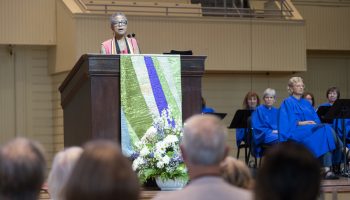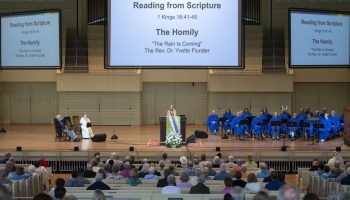“I have a vision that is coming into its own, that all the great religious traditions are coming together not to bash each other with dogma but to trade stories,” said the Very Rev. Alan Jones at the 9:15 a.m. Wednesday morning worship service. “We will have competitive compassion — I can be more humble than you. I want us to be competitive in works of mercy, of a gracious and healing way of living.”
His sermon title was “Reinventing the Human — (Getting to What’s Really Real) — Requires the Recovery of the Sacred.” The Scripture reading was Acts 17:24-29.
God made all the nations of the world from one love, but our tribalism disintegrates that one world. Jones reiterated his point that we live in a world of radical individuality (I am the center), and radical community (I cannot be me without you.) He quoted theologian Karen Armstrong that good theology makes one kind and sympathetic, and leads to concrete acts of kindness.
Julian Barnes, the English atheist, wrote a critique of American religion. Barnes wrote, “I don’t believe in God, but I miss him.” According to Jones, Barnes saw an extreme form of Christianity in America. Whereas the European view saw death as a long mouldering in the grave before going to the final end in God’s good time, Americans wanted the rapture, hurrying up to heaven to watch Jesus and the Antichrist duke it out in a technicolor last battle.
“In the certainty of our self-righteousness, God becomes a pawn in our self-justifying power,” Jones said. “When we pray to God, are we talking to the maker of all that is and moves and has being, or are we talking to our imaginary friend?”
The secular narrative is not much better, Jones said, because they think they have steamed away religious falsehood, but instead traded one form of religion for another. It is like they are saying “life is meaningless, but I am important.”
“More people have nothing from which to lapse,” he said. “They don’t have to unlearn anything.”
Our economy is about efficiency, our polity is about equality, and our culture is about self-realization. There are no moral underpinnings, and when that ethic is eroded we have the pursuit of wealth alone, which doesn’t justify itself.
“We have shifted from character to personality, from life to a lifestyle,” Jones said. “Steven Muller, former president of Johns Hopkins University, said that the university is rooted in science and is not rooted in a moral life so that we are turning out highly trained barbarians.”
Jones recalled an art exhibition that asked people to deface the Bible in the name of art. In a museum in Glasgow, Scotland, there was an exhibition called “Made in God’s Image” that invited people who felt they have been excluded from the Bible to use the pens provided to write themselves back into it. This leaves the world with hard religion or snotty atheism, Jones said.
James Woods, an atheist, wrote that what is most repellant about the new atheism is its surety. Metaphysics doesn’t go away just because you don’t believe in God. Writer Philip Larkin asked what do you do when unbelief is gone.
“Disbelief is functioning like believing,” Jones said. “What gives you genuine hope, or is it just wishful thinking? What makes you think you matter? We have to start by being amazed that we are here at all, what G.K. Chesterton called the ‘thin thread of thanks.’ ”
Jones calls himself a “progressive traditionalist.” He finds hopes in Daniel Bell’s book The Cultural Contradictions of Capitalism, where Bell claimed to be a socialist/liberal/conservative. Bell claimed to be a socialist in economic activity, where the community should take precedence over the individual so that everyone has basic needs met. He claimed to be a liberal in politics where the individual should be primary, where there are distinct public and private spheres that treat people equally. He claimed to be a conservative in culture, in that he respected tradition and believed that reasoned judgment in art and education should prevail.
“Religion is the source of our cultural symbols and fundamental questions,” Jones said. “We should live with amazement, gratitude and kindness. That is what unites believers and unbelievers. Everyone matters, and we are all in this together.”
He shared a story about creation. There was a time when no place was not God and God created emptiness and filled it with bowls of light. But the bowls broke and the perfect world God created shattered so that divine sparks landed everywhere.
The perfect world is all around us, he said, but it will be broken until someone puts the pieces back together.
“We are the ones to find the pieces,” Jones said. “When we meet, talk, eat, make love, work, then we can repair the bond; then there will be no place that is not God. We are just walking each other home. Be amazed, grateful and kind.”
The Rev. George Wirth presided. Peter Dawson has been a lay reader and eucharistic visitor for over 38 years at St. Luke’s Episcopal Church in Jamestown. For the past 14 years, he has served as chaplain to the Lakewood Fire Department, a position he also holds with Falconer, Ripley and Jamestown Fire Departments, at UPMC Chautauqua WCA Hospital, the Chautauqua County Sheriff’s Office and Lakewood-Busti Police Department. The Motet Choir sang “The Lord is My Shepherd” from John Rutter’s Requiem. Jared Jacobsen, organist and coordinator of worship and sacred music, directed the choir. The Samuel M. and Mary E. Hazlett Memorial Fund and the J. Everett Hall Memorial Chaplaincy support this week’s services.

